Related Research Articles

Intravenous therapy is a medical technique that administers fluids, medications and nutrients directly into a person's vein. The intravenous route of administration is commonly used for rehydration or to provide nutrients for those who cannot, or will not—due to reduced mental states or otherwise—consume food or water by mouth. It may also be used to administer medications or other medical therapy such as blood products or electrolytes to correct electrolyte imbalances. Attempts at providing intravenous therapy have been recorded as early as the 1400s, but the practice did not become widespread until the 1900s after the development of techniques for safe, effective use.
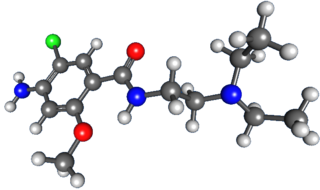
Metoclopramide is a medication used for stomach and esophageal problems. It is commonly used to treat and prevent nausea and vomiting, to help with emptying of the stomach in people with delayed stomach emptying, and to help with gastroesophageal reflux disease. It is also used to treat migraine headaches.
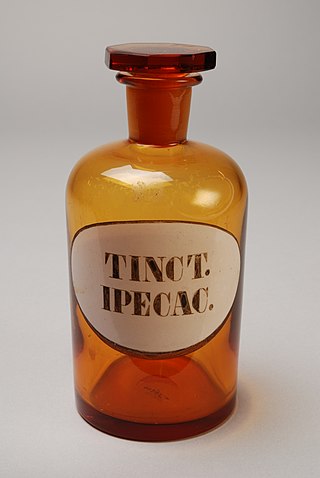
Syrup of ipecac, or simply ipecac, is a drug that was once widely used as an expectorant and a rapid-acting emetic. It is obtained from the dried rhizome and roots of the ipecacuanha plant, from which it derives its name. It is no longer regularly used in medicine.
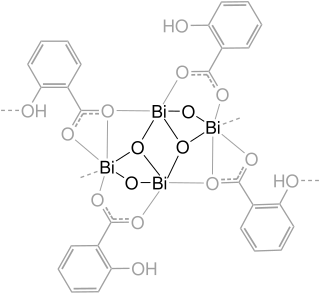
Bismuth subsalicylate, sold generically as pink bismuth and under brand names including Pepto-Bismol, Pepti-Calm and BisBacter, is a medication used to treat temporary discomfort of the stomach and gastrointestinal tract. This includes an upset stomach, heartburn or other similar symptoms.
Theodor "Theo" Karl Ludwig Gilbert Morell was a German medical doctor known for acting as Adolf Hitler's personal physician. Morell was well known in Germany for his unconventional treatments. He assisted Hitler daily in virtually everything he did for several years and was beside Hitler until the last stages of the Battle of Berlin. Hitler granted Morell high awards, enabling the latter to become a multi-millionaire through business deals with the Nazi government, made possible by his status.

The health of Adolf Hitler, dictator of Germany from 1933 to 1945, has long been a subject of popular controversy. Both his physical and mental health have come under scrutiny.

Tizanidine, sold under the brand name Zanaflex among others, is an alpha-2 (α2) adrenergic receptor agonist, similar to clonidine, that is used to treat muscle spasticity due to spinal cord injury, multiple sclerosis, and spastic cerebral palsy. Effectiveness appears similar to baclofen or diazepam. It is taken by mouth.

Methylscopolamine or methscopolamine, usually provided as the bromide or nitrate salt, is an oral medication used along with other medications to treat peptic ulcers by reducing stomach acid secretion. Proton pump inhibitors and antihistamine medications have made this use obsolete. It can also be used for stomach or intestinal spasms, to reduce salivation, and to treat motion sickness. Methscopolamine is also commonly used as a drying agent, to dry up post-nasal drip, in cold, irritable bowel syndrome and allergy medications

Prostaglandin E1 (PGE1) is a naturally occurring prostaglandin with various medical uses. Alprostadil and misoprostol are synthetic forms of prostaglandin E1 used as medications. Lubiprostone, a derivative of prostaglandin E1, is also used as a medication. Prostaglandin E1 is a vasodilator. It has various effects in the body that include opening blood vessels, relaxing smooth muscle, inhibiting clotting, and causing uterine contractions.

Fenbendazole is a broad spectrum benzimidazole anthelmintic used against gastrointestinal parasites including: giardia, roundworms, hookworms, whipworms, the tapeworm genus Taenia, pinworms, aelurostrongylus, paragonimiasis, strongyles, and strongyloides that can be administered to sheep, cattle, horses, fish, dogs, cats, rabbits, most reptiles, freshwater shrimp tanks as planaria and hydra treatments, as well as seals.

Werner Haase was a professor of medicine and SS member during the Nazi era. He was one of Adolf Hitler's personal physicians. After the war ended, Haase was made a Soviet prisoner of war. He died while in captivity in 1950.

Deracoxib is a nonsteroidal anti-inflammatory drug (NSAID) of the coxib class, used in dogs to treat pain associated with osteoarthritis, or to prevent pain following orthopedic or dental surgery. It is available as beef-flavored tablets.
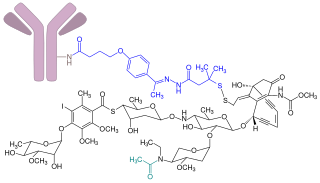
Inotuzumab ozogamicin, sold under the brand name Besponsa, is an antibody-drug conjugate medication used to treat relapsed or refractory B-cell precursor acute lymphoblastic leukemia. It is administered by intravenous infusion.

Eduard Bloch was an Austrian Doctor practicing in Linz, who, for many years until 1907, was the family doctor of Adolf Hitler and his family. When Hitler's mother, Klara, was dying of breast cancer, Bloch billed the family at a reduced cost and sometimes refused to bill them outright. An Austrian Jew, Bloch was awarded special protection by Hitler who personally intervened to ensure his safety following the German annexation of Austria in 1938. Following Kristallnacht and the escalation of anti-Jewish sentiment in Germany, Hitler allowed Bloch to emigrate to the United States, where he lived until his death in 1945, succumbing to stomach cancer.
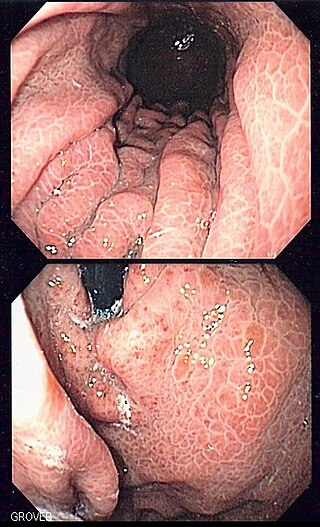
Portal hypertensive gastropathy refers to changes in the mucosa of the stomach in patients with portal hypertension; by far the most common cause of this is cirrhosis of the liver. These changes in the mucosa include friability of the mucosa and the presence of ectatic blood vessels at the surface. Patients with portal hypertensive gastropathy may experience bleeding from the stomach, which may uncommonly manifest itself in vomiting blood or melena; however, portal hypertension may cause several other more common sources of upper gastrointestinal bleeding, such as esophageal varices and gastric varices. On endoscopic evaluation of the stomach, this condition shows a characteristic mosaic or "snake-skin" appearance to the mucosa of the stomach.
Gastroenterocolitis is a condition characterized by inflammation of the stomach, small intestines, and colon.
Plotting Hitler's Death: The German Resistance To Hitler, 1933–1945 is a 1994 book by the historian Joachim Fest about the Germans, both civilian and military, who plotted to kill Adolf Hitler from 1933 onwards. It was written to mark the 50th anniversary of the 20 July plot to kill Hitler and translated into English in 1996. The book includes detailed accounts of various plots and explores the reasons the Allies and many within Germany gave little support to the resistance to Hitler. Among those treated extensively in the book are Colonel Henning von Tresckow and, later, Lieutenant Colonel Claus Schenk Graf von Stauffenberg.
An intracavernousinjection is an injection into the base of the penis. This injection site is often used to administer medications to check for or treat erectile dysfunction in adult men. The more common medications administered in this manner include Caverject, Trimix, Bimix, and Quadmix. These medications are all types of vasodilators and cause tumescence within 15 minutes. Common side effects include priapism, bruising, fibrosis, Peyronie's disease, and pain.
Onset of action is the duration of time it takes for a drug's effects to come to prominence upon administration. With oral administration, it typically ranges anywhere from 20 minutes to over an hour, depending on the drug in question. Other methods of ingestion such as smoking or injection can take as little as seconds to minutes to take effect. The determination of the onset of action, however, is not completely dependent upon route of administration. There are several other factors that determine the onset of action for a specific drug, including drug formulation, dosage, and the patient receiving the drug.
Release (Liberation) is the first step in the process by which medication enters the body and liberates the active ingredient that has been administered. The pharmaceutical drug must separate from the vehicle or the excipient that it was mixed with during manufacture. Some authors split the process of liberation into three steps: disintegration, disaggregation and dissolution. A limiting factor in the adsorption of pharmaceutical drugs is the degree to which they are ionized, as cell membranes are relatively impermeable to ionized molecules.
References
- ↑ Lambert, Angela (September 3, 2014). The Lost Life of Eva Braun. St. Martin's Press. p. 262. ISBN 978-1466879966.
- 1 2 Doyle, D (2005). "Adolf Hitler's Medical Care" (PDF). JR Coll Edinb. 35 (35): 75–82. PMID 15825245.